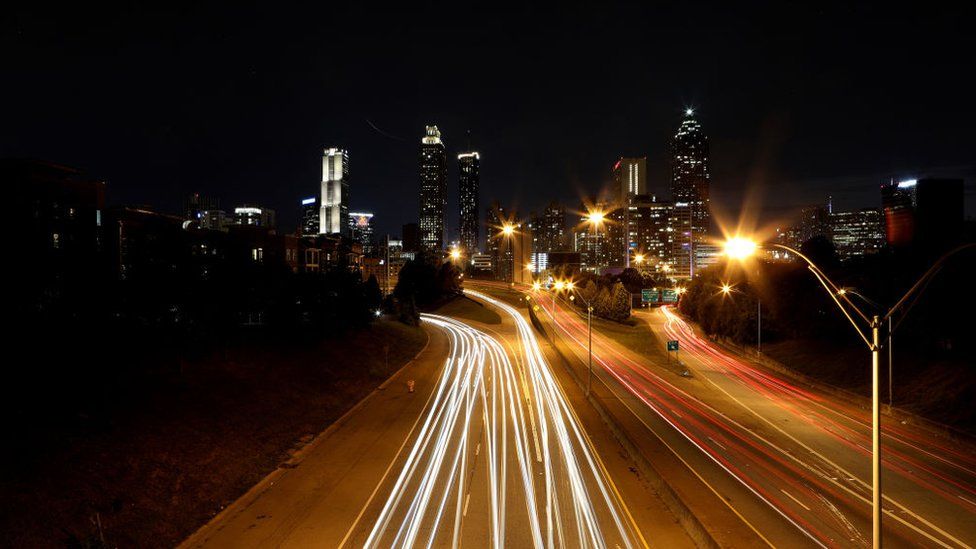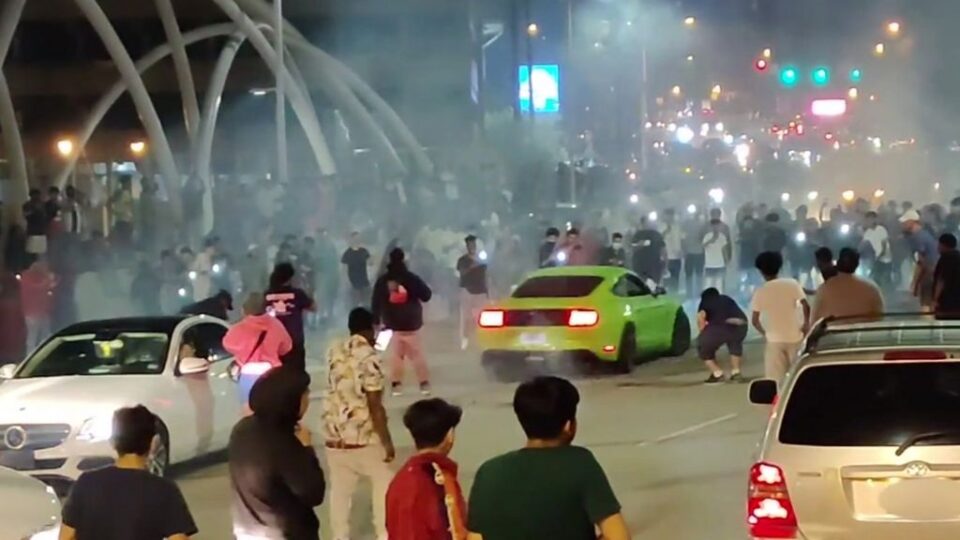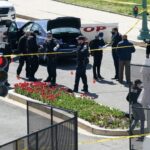Screeching tyres, revving engines and the gunshot “pop” of modified exhausts: these are the sounds of the Covid-19 pandemic in Atlanta, Georgia.
Illegal street racing has been roaring through the US for decades, and while it’s most associated with California and the hugely successful Fast and the Furious film franchise, head-to-head drag races are a fixture in many cities.
Atlanta’s scene has skyrocketed in the past year. As Covid keeps people indoors and traffic low, street racers – deprived of bars, clubs and company – have claimed the roads as their high-speed playground.
Residents in the most affected neighbourhoods, from East Atlanta up to affluent Buckhead on the city’s north side, are at their wits’ end.
Atlanta Police Department says the number of 911 calls mentioning “drag,” “racing” or “doughnuts” rose from about 36 in February 2020, to 568 in October.
Video shared on Facebook after the 4 July weekend captured a large crowd of onlookers blocking the Peachtree Street overpass, on a major street in Midtown Atlanta, as a car performed 360-degree spins
One northeast Atlanta woman told local channel WSB-TV:
“They’re completely blocking the street.
And I not only have a child in my home, I also have my 87-year-old elderly mother who has health concerns.
And if something were to happen, we would not be able to get out of our neighbourhood and get to the hospital fast enough.”
Neighbours also worried that pedestrians or other motorists could be hurt if a stunt-pulling driver lost control, or cars in a side-by-side race ran the wrong red light.
That fear became a reality just weeks later.
Anjanee McClain, 18, was killed alongside a three-month-old baby boy in September, when a BMW coupe speeding at more than 120mph (193 km/h) collided with their car in Midtown. Georgia State Patrol had tried to pull the BMW over but the driver refused to stop.
What was once seen as a flashy nuisance had become a public health risk.
Nick Nicholson has lived in Atlanta for about 37 years, 18 of them in Midtown – the high-rise heart of Georgia’s capital.
His apartment stands above one of the area’s main roads, which the racers love because it’s long, straight, one-way – and easy to turn into a giant oval with nearby thoroughfare West Peachtree.
“It makes a huge amount of noise,” he says. “If you’ve ever been to an automobile race on a track and it goes on for hours and your ears… Well, this is kind of what it’s like.”
People tend to use “street racing” as an umbrella term.
It might mean two cars speeding side-by-side, which this neighbourhood witnessed for much of last year.
Or it could be what the law calls “laying drag”, which includes drivers zig-zagging or doing 360-degree doughnut spins.
Locals say stunts like these are more common lately than traditional races.
Drivers will stage what’s called a “takeover”, blocking off a junction to cars coming the other way, and do “sideshows” for onlookers.
Popular tricks include burnouts – spinning their wheels while stationary to make dramatic plumes of smoke.
Over the past year, Atlanta PD has attempted a crackdown, issuing more than 100 citations every weekend
Anyone arrested after street racing in the city is now barred from posting bond immediately, and must be held in jail until they appear before a judge, usually within 48 hours.
Plenty of culprits walk away with a penalty notice, however. When arrests are made and the vehicle impounded, it’s often because of other factors – such as drugs or illegal guns being found in the car.
It’s also challenging for police to physically catch street racers.
The department has a “no chase policy” – meaning officers don’t pursue suspects in vehicles because of the risks. So they’re reliant on support from Georgia State Patrol, who do chase.

But many residents want to see more frequent raids and steeper punishments – including impounding the culprits’ cars for long stretches.
If you ask street racers why they do it, you’ll get two main answers: The thrill of breaking the law, and a love of fast cars, which they say they often lack space or facilities to push to the limit elsewhere.
Freesmoke100 is the founder of Vengeance Auto Club, a New York-based takeover club with chapters across the US. Its members travel widely, sometimes to other states, to put on stunt-filled “smoke shows”.
“We had about 300 members within the last five years, in different cities.
Detroit, New York, Baltimore, Philadelphia… We even had some members in Canada. We went across a bunch of cities in the east coast. Georgia – we had a bunch of members over there,” he says.
Freesmoke100, who also goes by Smoke, says Vengeance isn’t focused on street racing, but some members still do it.
“If they want to leave us at the end of the night and go street racing, and they get their car impounded or they get into an accident or whatever the case is – that’s on them,” he says.
He draws a distinction between racing and takeovers, as he believes blocking off a junction to do stunts at 20mph is less dangerous than speeding side-by-side down public roads at 150mph.
“It’s a way of us expressing ourselves, it gives us a sense of freedom to do these things, like, lawlessly, I guess?
“When it starts you have a meeting location, you guys are all interacting there, talking and stuff.
You set up how you’re gonna get on the road, making sure you’re blocking off intersections where nobody’s gonna get hurt, how everybody stays together, how we look out for different law enforcement tracking us and things like that.”
While many Atlantans see their local street racers as a persistent menace, with some areas constantly targeted, Smoke says his crew organise meets in different cities, and don’t stick around for long.
In his eyes, high-spec cars are great public entertainment, especially in neighbourhoods that haven’t seen them outside of films or video games.
“Our main focus is we go into minority neighbourhoods, low-income neighbourhoods, where kids don’t usually see these high-powered cars – Dodge SRTs, Hellcats – and we’ll go through with 100, 200 cars and we’ll stop.
We’ll close off intersections [by blocking them with stationary cars], and we’ll do doughnuts, burnouts and stuff in the middle of the intersection.
We call them takeovers ‘cos we’re usually taking over different neighbourhoods in different cities.
“We want it to be spontaneous and give it to people who’re not expecting it. Kids going by, the kids will be seeing all the cars, all amazed and going ‘do a burnout!’ or something like that, and that’ll kind of get us going.
“We make sure we go to areas that’s kind of forgotten by law enforcement, the government, the city… they don’t pay these areas any mind. So when we go there it’s like… someone acknowledges us. Someone knows that we’re here.”

The police don’t tend to see it that way, he concedes with a laugh.
“It depends who’s on that day! In general, no they’re not fans. But I’ve done events before where you have police there and they cheer you on or they don’t make a big deal of what you’re doing. If they do give you a ticket they’ll give you a reckless driving ticket, or maybe running a red light.”
Smoke adds that a lot of people on his team are professional men and women. He lists nurses, business owners, mechanics – and police officers.
Whatever the claims about responsible tyre checks and “safely blocked” junctions, there’s still a clear risk a driver could lose control of their car and injure themselves or someone else. Smoke acknowledges that, but says it’s his own team members who tend to get hurt.
“When you have an individual that wants to be recording [on a phone camera], and get right in the middle of it to get these close shots, they don’t have the footwork for it sometimes.
They end up getting hit. We have a term, it’s called ‘get back or get smacked.'”
If someone gets injured, he says, the club puts in place a rule to prevent a reoccurrence. But with a high membership turnover, it’s a challenge to ensure everyone knows and follows that guidance.
And as events in Atlanta have shown, there will always be some whose love of speed surpasses their concern for others’ lives.
Last May, Atlanta’s Mayor Keisha Lance Bottoms said she was considering creating a designated legal area for street racing and sideshow antics like burnouts, in a bid to curb reckless driving.
The idea got a poor reception from some in authority – including Atlanta City councilmember Dustin Hillis, who told the BBC:
“I would not want to use any city assets, city land, public roadways, whatever… to condone and set up this activity just because of the massive liability.”
But others think it’s just what the city needs.
Car-mad Detroit has already backed legal meet-ups. The city’s police chief, James Craig, helped local stunt drivers find a private venue, saying he wanted to be “part of the solution”.
The result was a weekly event where drivers get their tyre-spinning fix in front of crowds, with police approval.
Speaking from New York, Smoke says fast car aficionados from across the US have begged officials for more legal race tracks.
“Our nearest race track is in New Jersey, which is about two-and-a-half hours away. If we were able to get a track or a place to do these stunts, I’m sure it would minimise the amount of illegal activity.”
Yet he admits a solution away from public streets would never quite scratch the itch for him, and others like him.
“Even if they gave me a legal spot, I would probably never give up travelling to different cities and doing it just spontaneously in front of a crowd of people – for the excitement on their face.”
bbc




